In 2016 the Libertarian Party enjoyed 50-state ballot access for the first time since 1996, and polled higher than any third party had since Ross Perot took the 1992 presidential election by storm on the Reform Party ticket.
It was a remarkable year for the LP in its half century history (the Libertarian Party was founded in 1971), during an election year that was remarkable in other ways for the two main political parties.
Election year turn out for both Republicans and Democrats were at 20 year lows while the LP was soaring at an all time high with 4 million votes cast for Gary Johnson and Bill Weld, the presidential nominees of the United States' third largest political party.
Something else remarkable about the LP ticket in 2016– it was the first time there had been two governors on a U.S. party presidential ticket in almost a century. They were the most experienced, well-credentialed candidates Libertarians had ever backed for president.
When Gary Johnson won the LP's nomination in 2016, he endorsed Bill Weld to be his running mate, and the party nominated Weld to the Vice Presidential slot on the ticket.
Many opposed Weld for being a latecomer to the LP, but also for his record as governor of Massachusetts, during which he did a 180 from his campaign platform on gun policy and "called for a statewide ban on assault weapons," supported "affirmative action" policies most libertarians consider racially biased and unfair to individuals, and endorsed tighter EPA regulations.
Still others supported Weld, enough to land him on the Libertarian Party's ticket and launch him into the LP's most successful ever presidential campaign.
The Cato Institute, Washington D.C.'s libertarian public policy think tank, gave him good marks on his governor's fiscal report card for cutting state taxes and spending, privatizing state services, and balancing the budget, despite intense opposition from Democrats in an overwhelmingly Democratically-controlled state.
Indeed the fact that Bill Weld was able to become elected as the Republican governor of such a heavily Democratic state should interest independent voters. Gary Johnson overcame incredible partisan odds to become his state's quite popular two-term Republican governor as well. The two seemed to defy many party expectations and delivered measurable, small-government fiscal policy coups through a laser focus on practical governance.
With 2016 in the rear view mirror, Weld is now looking forward to 2020, and sees an enormous opportunity for Libertarians in the age of social media and growing discontent with the two party system.
In an April 30th interview with Reason Magazine's Matt Welch at the 2018 Libertarian Party of California State convention, Weld said:
"I really have been doing a lot of reading and thinking about what it means to be the Libertarian Party, and what possible achievements and upsides the Libertarian Party could ... I take this stuff seriously.
But I'm sincere when I say that I'm not talking about who is going to do the Libertarian race in 2020; I'm just here to say that I think that's a race that has some real potential to go the distance, and the sooner we all wrap our minds around that, the better."
He's been suiting actions to words, traveling across the country on a tour of the LP's state conventions to inspire members to grow the party and shoot for the Moon in 2020, telling Libertarians:
"The number one thing we need to do by November 2020 is to elect a Libertarian president of the United States."
